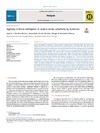Identificador persistente para citar o vincular este elemento:
https://accedacris.ulpgc.es/jspui/handle/10553/70179
| Título: | Applying artificial intelligence to explore sexual cyberbullying behaviour | Autores/as: | Sánchez Medina, Agustín Jesús Galván Sánchez, Inmaculada Fernández Monroy, Margarita |
Clasificación UNESCO: | 120304 Inteligencia artificial 611402 Actitudes 630707 Tecnología y cambio social |
Palabras clave: | Artificial Intelligence Business Cyberbullying Dark Triad Ensemble Classification Tree, et al. |
Fecha de publicación: | 2020 | Publicación seriada: | Heliyon | Resumen: | Sexual cyberbullying is becoming a serious problem in today's society. In the workplace, this issue is more complex because of the power imbalance between potential perpetrators and victims. Preventing sexual cyberbullying in organizations is very important for a safety and respectful workplace. Occupational Safety and Health (OSH) standards establish certain policies to be considered to create an organizational culture based on zero tolerance to sexual cyberbullying. The research aims to broaden knowledge about personality and sexual cyberbullying. Therefore, this paper proposes a crucial tool to explore potential sexual cyberbullying behaviour. This study analysed how personality traits, particularly those related to the Dark Triad (psychopathy, Machiavellianism and narcissism), might influence this behaviour. Participants (N = 374) were Spanish young adults, using the convenience sampling to recruit them. The methodology focused on the use of structural equation modelling and ensemble classification tree. First, we tested the proposed hypotheses with structural equation method based on covariance using the Lavaan R-package. Second, for the ensemble of classification trees, we applied the package randomForest and Adabag (bagging and boosting) in R. Results proposed high levels of psychopathy and Machiavellianism are more likely to be related to sexual cyberbullying behaviours. Organizations could use the tool proposed in this research to develop internal policies and procedures for detection and deterrence of potential cyberbullying behaviours. By raising awareness about cyberbullying behaviour including its conceptualisation and measurement in training courses, organizations might build an organizational culture based on a respectful workplace without sexual cyberbullying behaviours. Cyberbullying; Dark triad; Machiavellianism; Narcissism; Psychopathy; Structural equation modelling; Ensemble classification tree, Artificial intelligence; Machine learning; Business; Human resource management | URI: | https://accedacris.ulpgc.es/handle/10553/70179 | ISSN: | 2405-8440 | DOI: | 10.1016/j.heliyon.2020.e03218 | Fuente: | Heliyon [ISSN 2405-8440], v. 6 (1), e03218 |
| Colección: | Artículos |
Citas SCOPUSTM
29
actualizado el 08-jun-2025
Citas de WEB OF SCIENCETM
Citations
22
actualizado el 01-mar-2026
Visitas 5
97
actualizado el 10-ene-2026
Descargas
86
actualizado el 10-ene-2026
Google ScholarTM
Verifica
Altmetric
Comparte
Exporta metadatos
Los elementos en ULPGC accedaCRIS están protegidos por derechos de autor con todos los derechos reservados, a menos que se indique lo contrario.
